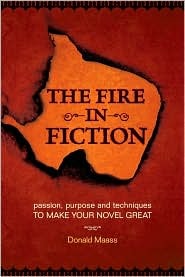Below is an exercise from Donald Maass's The Fire in Fiction to help find and develop your author's voice.
2. Rewrite the page, stripping all colorful description and replacing nouns and verbs with generic choices. Make the characters and action bland.
3. Rewrite the page again, using all upper crust formality.
4. Rewrite it again, making main character easily offended by everything.
5. Rewrite again, observing as a foreign tourist, with awe and bewilderment.
6. Rewrite it again, utilizing the wisdom of an elderly person.
7. Finally, rewrite it as it will appear in print, embracing your own voice—opinions, observations, sensibilities.
(The above exercise is paraphrased from Donald Maass’s The Fire in Fiction.)
An author's voice is “… the outlook, opinions, details, delivery, and original perspectives that an author brings to his tale. Above all, a singular voice is not a lucky accident; it comes from a storyteller’s commitment not just to tell a terrific story but to tell it in a way that is wholly his own.”
-- Donald Maass, Literary Agent
What do you think? Have you mastered your own distinctive author's voice?







